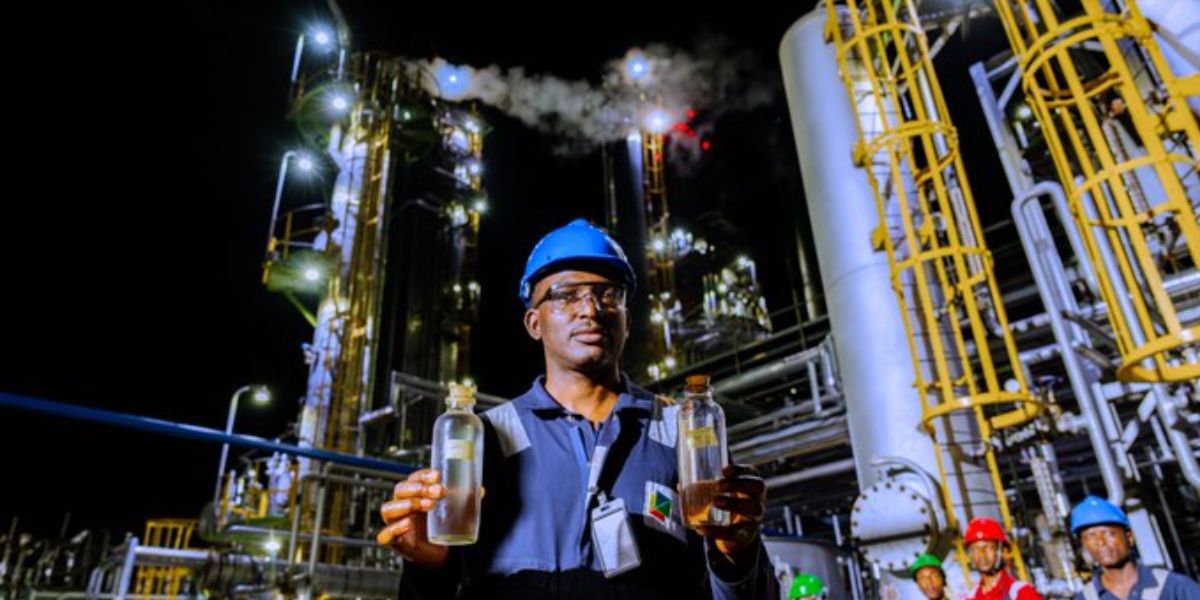– –
The Petroleum Products Retail Outlets Owners Association of Nigeria (PETROAN) has said the price of Premium Motor Spirit churned out by the old Port Harcourt Refinery which resumed production on Tuesday, is ₦75 per litre higher than that sold by the Dangote Refinery.
This was revealed by the association’s Public Relations Officer, Dr. Joseph Obele, during the official reopening ceremony of the refinery, which is now operating at a capacity of 60,000 barrels per day.
Dr Obele, a former chairman of the Independent Petroleum Marketers Association of Nigeria (IPMAN) at the Port Harcourt Deport who initially applauded the federal government for revitalising the old refinery, expressed concern over the pricing disparity between petrol supplied by the Nigerian National Petroleum Company Limited (NNPCL) and the Dangote Refinery.
– –
Join Our WhatsApp Group
Don’t miss out on any real-time information. Join our WhatsApp group to stay updated.
According to him, while Dangote Refinery sells petrol to marketers at N970 per litre, NNPCL’s price stands at N1,045, a difference of N75 per litre.
He said the N75 price differential is a steep margin for businesses, particularly for an industry where profitability hinges on competitive pricing.
He, however, described the refinery’s restoration as a significant step in reducing Nigeria’s dependence on imported petroleum products.
Obele revealed that the Group Chief Executive Officer of NNPCL, Mele Kyari, has promised to address the issue and harmonise prices to mitigate the impact on marketers and consumers.
– –
On Tuesday, November 27, the NNPCL announced that the Old Port Harcourt Refinery began operating at 70% capacity and producing significant volumes of petroleum products daily.
This marks a milestone in the refinery’s recovery after years of operational setbacks.
In a statement issued by Olufemi Soneye, Chief Corporate Communications Officer of NNPC Ltd., the refinery produces the following outputs daily:
Straight-Run Gasoline (Naphtha): Blended into 1.4 million liters of Premium Motor Spirit (PMS or petrol).
Kerosene: 900,000 liters; Automotive Gas Oil (AGO or diesel): 1.5 million liters.; Low Pour Fuel Oil (LPFO): 2.1 million liters; and Liquefied Petroleum Gas (LPG): Additional volumes.
What you should know
– –
the construction of the old Port Harcourt Refinery started in 1963, with 35,000 bpd initial capacity and was inaugurated in 1965, to refine fuel oil, gas oil, petrol and dual purpose kerosene for local consumption and for export.
The capacity was increased to 60,000 bpd between 1967 and 1970 in order to meet increased demand before the fuel shortages of the 1970s put pressure on the government for further expansion.
Join Our WhatsApp Group
Don’t miss out on any real-time information. Join our WhatsApp group to stay updated.
It was gathered that with the recommendations of the Oputa Commission, two new refineries were constructed in Kaduna and Warri with 35,000 bpd.
The capacities of the plants were later increased to 110,000 bpd for Kaduna and 125,000 bpd for Warri, while the contract for the construction of the fourth refinery, in Port Harcourt was awarded in 1984 with 150,000 bpd capacity, thus increasing Nigeria’s total installed capacity to 445,000 bpd.
However, while some past administrations strived to maintain and optimize the operations of the refineries, others did not, a development that culminated in frequent breakdowns, shortages and massive importation of the petroleum products.
The past administrations also considered leasing, management contract and privatization as possible options while issuing licenses to enable private investors establish new refineries.
Intel Region News is on WhatsApp!
Share News with us via Email:
:
– –



